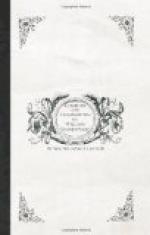Sir Thomas had fallen into a most comfortable and refreshing slumber ere this lecture was concluded; but the pause broke it, as there be many who experience after the evening service in our parish-church. Howbeit, he had presently all his wits about him, and remembered well that he had been carefully counting the syllables, about the time when I had pierced as far as into the middle.
“Young man,” said he to Willy, “thou givest short measure in every other sack of the load. Thy uppermost stake is of right length; the undermost falleth off, methinks.
“Master Ephraim, canst thou count syllables? I mean no offence. I may have counted wrongfully myself, not being born nor educated for an accountant.”
At such order I did count; and truly the suspicion was as just as if he had neither been a knight nor a sleeper.
“Sad stuff! sad stuff, indeed!” said Master Silas, “and smelling of popery and wax-candles.”
“Ay?” said Sir Thomas, “I must sift that.”
“If praying for the dead is not popery,” said Master Silas, “I know not what the devil is. Let them pray for us; they may know whether it will do us any good. We need not pray for them; we cannot tell whether it will do them any. I call this sound divinity.”
“Are our churchmen all agreed thereupon?” asked Sir Thomas.
“The wisest are,” replied Master Silas.
“There are some lank rascals who will never agree upon anything but upon doubting. I would not give ninepence for the best gown upon the most thrifty of ’em; and their fingers are as stiff and hard with their pedlary, knavish writing, as any bishop’s are with chalk-stones won honestly from the gout.”
Sir Thomas took the paper up from the table on which I had laid it, and said after a while, —
“The man may only have swooned. I scorn to play the critic, or to ask any one the meaning of a word; but, sirrah!”
Here he turned in his chair from the side of Master Silas, and said unto Willy, —
“William Shakspeare! out of this thraldom in regard to popery, I hope, by God’s blessing, to deliver thee. If ever thou repeatest the said verses, knowing the man to be to all intents and purposes a dead man, prythee read the censurable line as thus corrected, —
‘Pray for our Virgin Queen, gentles! whoe’er you be.’
although it is not quite the thing that another should impinge so closely on her skirts.
“By this improvement, of me suggested, thou mayest make some amends--a syllable or two—for the many that are weighed in the balance and are found wanting.”
Then turning unto me, as being conversant by my profession in such matters, and the same being not very worthy of learned and staid clerks the like of Master Silas, he said, —
“Of all the youths that did ever write in verse, this one verily is he who hath the fewest flowers and devices. But it would be loss of time to form a border, in the fashion of a kingly crown, or a dragon, or a Turk on horseback, out of buttercups and dandelions.




